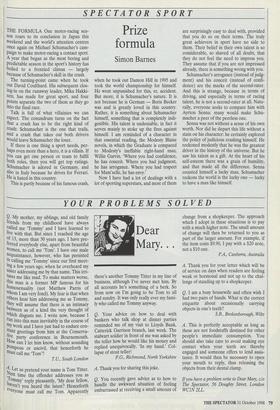SPECTATOR SPORT
Prize formula
Simon Barnes THE FORMULA One motor-racing sea- son roars to its conclusion in Japan this weekend and the world's attention centres once again on Michael Schumacher's cam- paign to make motor-racing a contact sport. A year that began as the most boring and predictable season in the sport's history has boiled to a frenzied climax — largely because of Schumacher's skill in the crash. The turning-point came when he took out David Coulthard. His subsequent clos- ing-in on the runaway leader, Mika Haldci- nen, has made for great sport, and four Points separate the two of them as they go into the final race. Talk is full of what villainies we can expect. The conundrum turns on the fact that a crash has to be the right kind of crash: Schumacher is the one that trails, and a crash that takes out both drivers would leave Schumacher the loser. If there is one thing a sport needs, per- haps even more than a hero, it is a villain. If You can get one person or team to fulfil both roles, then you will get top ratings. Schumacher is adored in Germany, and also in Italy because he drives for Ferrari. He is hated in this country. This is partly because of his famous crash, when he took out Damon Hill in 1995 and took the world championship for himself. He went unpunished for this, er, accident. But more, it is Schumacher's nature. It is not because he is German — Boris Becker was and is greatly loved in this country. Rather, it is something about Schumacher himself, something that is completely indi- gestible. His talent is undeniable, in fact it serves mainly to stoke up the fires against himself. I am reminded of a character in that essential reading, the Modesty Blaise novels, in which the Graduate is compared to Modesty's ineffable right-hand man, Willie Garvin. 'Where you had confidence, he has conceit. Where you had judgment, he has arrogance. Where you had respect for Mam'selle, he has envy.' Now I have had a lot of dealings with a lot of sporting superstars, and most of them are surprisingly easy to deal with, provided that you do so on their terms. The truly great achievers in sport have no side to them. Their belief in their own talent is so considerable, so shaved of all doubt, that they do not feel the need to impress you. They assume that if you are not impressed already, there is something wrong with you. Schumacher's arrogance (instead of judg- ment) and his conceit (instead of confi- dence) are the marks of the second-rater. And this is strange, because in terms of driving, and especially in terms of racing talent, he is not a second-rater at all. Natu- rally, everyone seeks to compare him with Ayrton Senna: many would make Schu- macher a peer of the peerless one. Senna was not without a sense of his own worth. Nor did he depart this life without a stain on his character: he certainly explored the policy of judicious crashing himself. He reckoned modestly that he was the greatest driver in the history of the universe. But he saw his talent as a gift. At the heart of his self-esteem there was a grain of humility, and that made all the difference. Senna counted himself a lucky man. Schumacher reckons the world is the lucky one — lucky to have a man like himself.


















































































 Previous page
Previous page